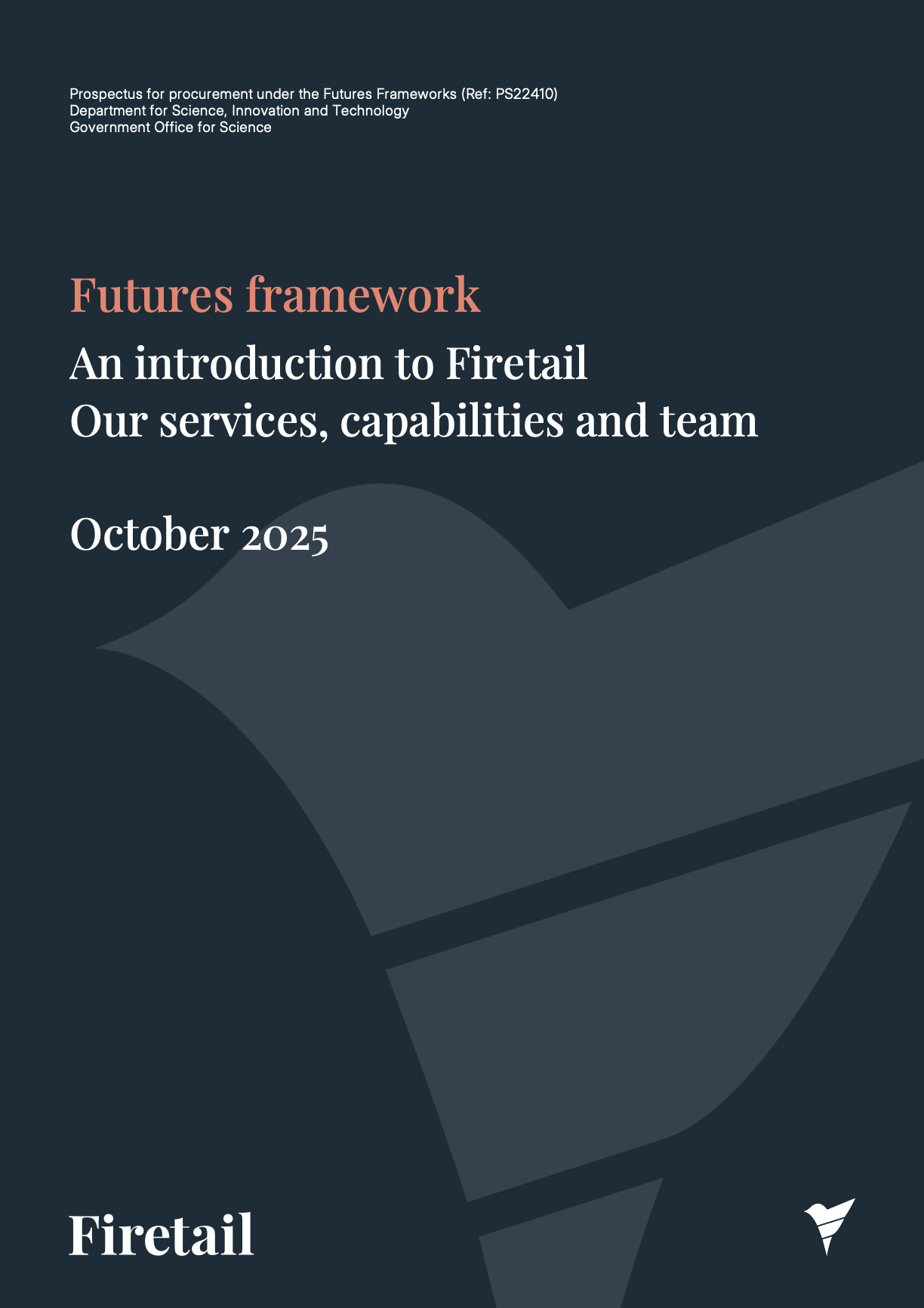
Firetail helps clients consider and anticipate uncertain and difficult futures, enabling organisations to prepare for how to deliver most impact in a changing world.
Futures and foresight
We are experienced at working in multi-stakeholder environments, with organisations and individuals that hold competing definitions of success, different perspectives about the future, as well as different capacities and capabilities for change.
We have built a team of multidisciplinary experts to help our clients meet these challenges. They bring cross-sector experience, new insights and an understanding of appropriate methodologies.
Our clients use Futures thinking to:
Reframe the conversation around an issue. It gives people space away from day-to-day issues to think about the future and its consequences.
Create space for ambitious change. Deep conversations about the future let people think about the long-term and about more ambitious policies and projects.
Build and connect community: Our approaches establish a shared understanding and language for the essential issues in a topic or area – in terms of defining success, or understanding the challenges ahead.
Too often, organisations are unable to turn the insights of their thinking about the long-term into actions for the short and medium term. We focus on delivering actionable insight to support decision-making and develop impactful policy.
Relevant case studies include:
RSPCA - What will animal wellbeing look like in 2050?
Department for the Economy - How will AI impact the future of work by 2030?
Royal Society of Chemistry - How can the chemical sciences tackle global challenges?
Futures and foresight
-
Horizon scanning is a systematic method for identifying drivers, trends, and signals to anticipate and assess critical uncertainties and emerging risks.
We see four main benefits for where horizon scanning can support strategic and operational planning, helping organisations become:
More adaptive. Horizon scanning can enable policing to adapt their strategies and operations in response to early signals of change. By regularly scanning the external environment, organisations can detect shifts in their environment before they become disruptive. This is similar to how having access to a range of intelligence about the operational picture helps with adapting tactics and operational priorities.
More anticipatory. Instead of reacting after a crisis has developed, horizon scanning can allow policing to systematically anticipate and assess future threats and opportunities. This foresight enables better preparation and early interventions. This can help organisations to move beyond ‘react mode’ and to have more anticipatory responses, which can help increase public trust and confidence by addressing issues before they become crises.
More resilient. Resilience is about building capacity to absorb shocks and recover quickly. Horizon scanning can help policing to identify potential risks and vulnerabilities, allowing them to prepare for multiple scenarios. Considering a range of emerging risks and critical uncertainties can support the development of contingency and continuity plans.
More proactive. Horizon scanning shifts organisations from being reactive to proactive. It ensures that new trends, risks, and technologies are acted upon early rather than being dealt with as crises. This may be through the development of preventative policies, early intervention programmes, or upstream community engagement; helping to put in place proactive responses that help to respond to emerging risks before they develop.
-
Scenario planning is a strategic approach that helps organisations prepare for uncertainty by exploring potential future scenarios and developing flexible strategies to adapt to various outcomes rather than relying on a single prediction.
Firetail uses six core principles to ensure our scenario planning makes a real difference: divergent, plausible, participative, engaging, challenging, and relevant.
Read our related blog post here.
-
Firetail's strategic foresight training equips leaders, strategists and analysts with practical tools to anticipate change, identify emerging opportunities and threats early, and build organisational resilience for an uncertain future.
Our training programmes combine established futures methodologies with sector-specific applications. Participants learn through hands-on exercises using real organisational challenges, developing skills they can immediately apply to strategic planning and decision-making. We offer flexible delivery from one-day intensives to extended programmes, tailored to your organisation's needs and context. Core topics include:
Scanning. Systematic approaches to identify and assess emerging trends, moving beyond obvious signals to analyse weak indicators of change and their potential impact on your organisation.
Scenarios. Techniques to develop and use scenarios for understanding how your operating environment might evolve, testing strategic assumptions, and exploring implications for your mission and services.
Strategy. Tools like Three Horizons and backcasting to convert futures insights into practical action, identifying key decision points and building robust strategies that can adapt to changing conditions.
Outcomes you can expect include a structured understanding of your impact, credible and compelling evidence for partners, and a confident, replicable way to improve performance over time.

